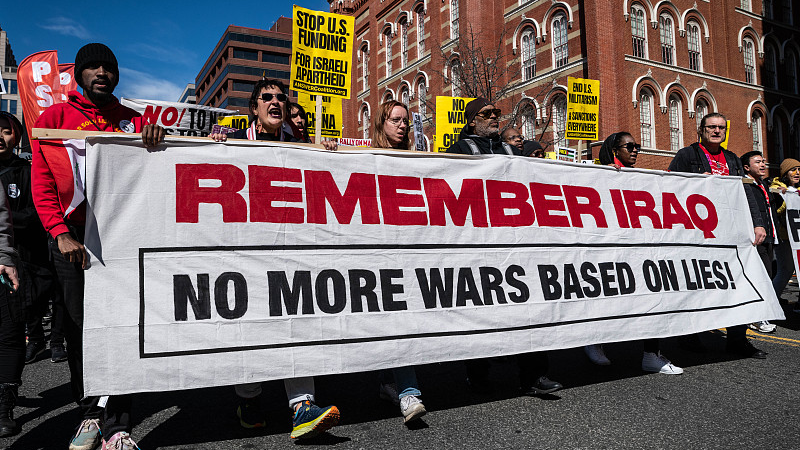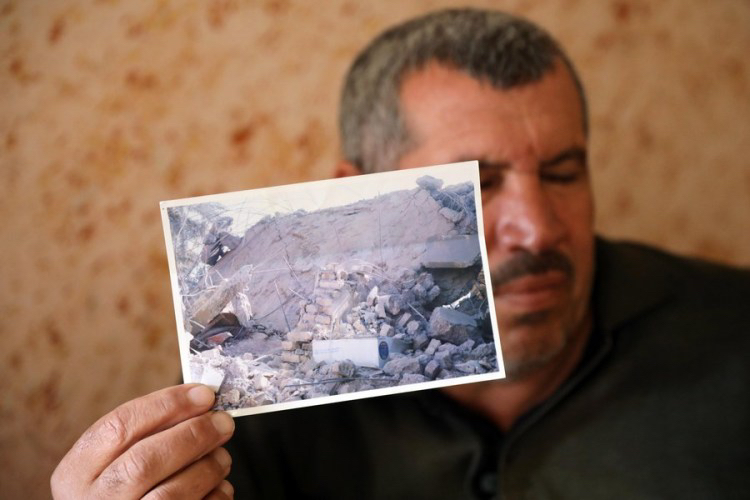
Anti-war protesters march through Washington, D.C. March 18, 2023. /CFP
Anti-war protesters march through Washington, D.C. March 18, 2023. /CFP
Editor's note: Mariam Shah is an Islamabad-based independent researcher in the field of conflict studies and military psychology. The article reflects the author's opinions and not necessarily the views of CGTN.
March 20 marks 20 years since the United States and Coalition forces invaded Iraq on false claims. A series of lies and exaggerations led to the brutal invasion of Iraq. As evaluated by several experts, journalists, and academics, the invasion of Iraq still stands as one of the most controversial decisions by the United States and its allies. It has since been widely regarded as an unjust and unnecessary war on all the standards and parameters of "just war," international law, and more importantly, morality.
The consequences and costs of the years-long war are immense. Even today, Iraq faces the results of this invasion, as it destroyed the essential fiber of the society, gripping the nation in gunpowder, blood, and dust. It's not just Iraq. The entire region suffered through the repercussions of the immoral invasion.
The war killed thousands of Iraqi civilians, and the overall war caused massive death, destruction, and political instability in Iraq. As per an estimate, the direct violence in Iraq caused the death of more than 300,000. The indirect suffering caused by disease and trauma continued to kill thousands more. Thousands more were injured, traumatized, and displaced from their homes and communities, and nothing can justify the suffering caused by the decisions of a few senseless individuals.
A report from the Costs of War project at Brown University revealed that 20 years of post-9/11 wars have cost the U.S. an estimated $8 trillion and have killed more than 900,000 people.
The invasion of Iraq also shows that the ulterior motives of states without respect for human life and international law can destroy the entire country and the lives of thousands of innocent individuals. The whole Iraq invasion was based on the pretext of misbelief of the presence of "weapons of mass destruction," which was the primary justification for the attack. It was one of the biggest human rights and international law violations committed by the United States. Later, it became one of the sparks that fueled the flames of extremism in the Middle East, disrupting regional peace and stability.

Abdullah Ibrahim shows a photo of his house destroyed by a reckless U.S. missile, which also left him disabled, in Salahudin province, Iraq, January 4, 2022. /Xinhua
Abdullah Ibrahim shows a photo of his house destroyed by a reckless U.S. missile, which also left him disabled, in Salahudin province, Iraq, January 4, 2022. /Xinhua
The subsequent rise of ISIL is directly related to the invasion of Iraq, as it allowed certain elements to fill the power gap created by enormous political, social, and economic chaos due to the war and violence. Besides the direct impact on the Iraqi people, the invasion destabilized the region and created a power vacuum that allowed extremist groups to thrive. Moreover, the war created a sectarian divide, endemic violence, and voids at various levels to be filled by terrorists years later.
From all the past U.S. military interventions, it is evident that they aggravate and further militarize conflicts and that the ordinary people of the occupied states pay the greatest price. Even after decades, the entire region still pays the price for what the U.S. and its allies did to "promote a shining city on the hill of democracy" in Iraq. The ultimate victims are the Iraqi people, who still face the brunt of the war, and citizens of neighboring countries.
Moreover, it is astonishing to see the audacity of the Western media and leaders saying the Iraq war was a "mistake" and getting over it. It is high time to admit that it was a brutal bloodshed of thousands of innocent Iraqis. The invasion was based on a series of "planned lies," disrespect for international law and norms, and veiling the hegemonic ambitions as "liberation." Ironically, the United States was trying to "bring freedom and democracy" through torture, cluster bombs, misery, degradation, and death to the Iraqi people.
From initiation to intentions and from conduct to withdrawal, the invasion of Iraq fails on all three significant aspects of the justification of war; justice of going to war, justice of conduct during the war and justice after the war.
During the last two decades, the United States and its allies committed massive war crimes and international law violations by killing thousands of civilians and destroying entire states. Stephanie Savell, co-director of the Costs of War project, reflected, "twenty years from now, we'll still be reckoning with the high societal costs of the Afghanistan and Iraq wars – long after U.S. forces are gone."
We keep hearing about the so-called rules-based international order from the Western world, and it was the same that the U.S. and its allies broke in 2003. Twenty years later, the invasion of Iraq needs accountability more than ever now, as the only legacy it left was pain.
(If you want to contribute and have specific expertise, please contact us at opinions@cgtn.com. Follow @thouse_opinions on Twitter to discover the latest commentaries in the CGTN Opinion Section.)